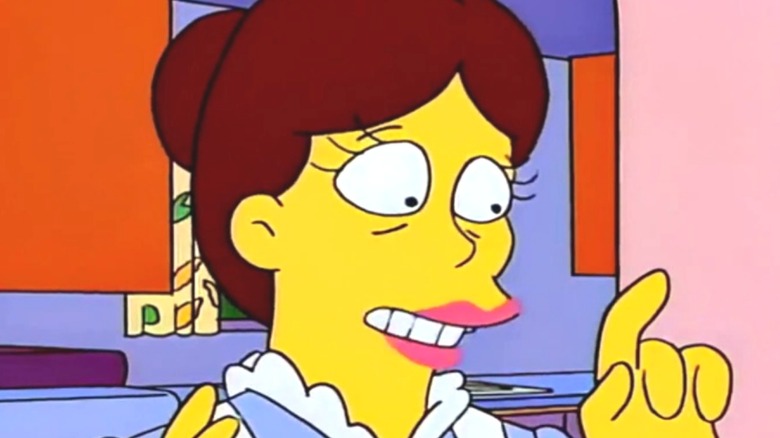
After 32 years on the air, it takes real mettle to appear in only one episode of "The Simpsons" and leave such an impression that the audience never forgets you. And yet, some characters make such a grand contribution to the series, or provoke such a change in one of our beloved regulars, that a single adventure is all we needed to see. In that spirit, we salute those magnificent one-timers who, even with their brief screen time, made an indelible mark on the greatest television show of all time.
But first, a few honorable mentions! Hats off to Frank Grimes, Birch Barlow, Homer's college nerd buddies, and Spider-Pig. Sadly, all of these characters had significant speaking roles (or, in Plopper's case, oinking appearances) after their debut episodes. That said, Homer's famously uptight adversary, a Rush Limbaugh send-up, a trio of geeky tutors, and one porcine powerhouse are all worthy of recognition. Despite later drop-ins, each made their name in a single episode, earning their place in the "Simpsons" pantheon even if they were dropped from our list on a technicality.
Quilloughby (Benedict Cumberbatch) — Panic On The Streets Of Springfield
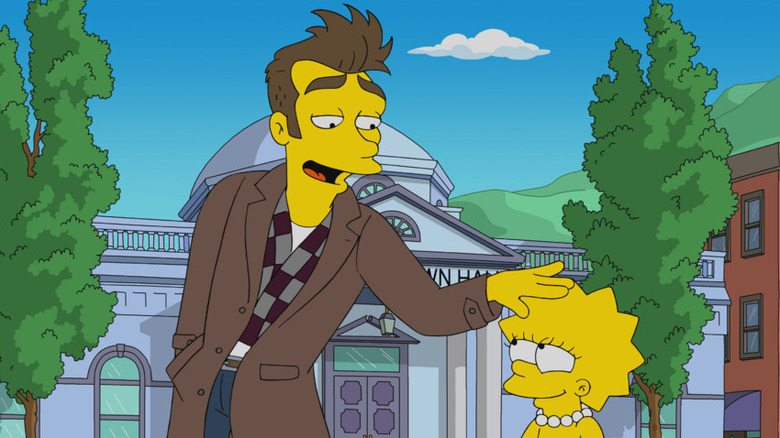
We know! We know! "Really? A character from the most recent season?" you might be asking. But Quilloughby, a thinly-veiled parody of the famously prickly singer Morrissey, is more than worthy of appearing on our list.
The usually distinctive Benedict Cumberbatch disappears into the role, giving the cynical warbler a wry tone and floppy disdain that makes him a noteworthy creation. Likewise, the show's animation team gives Quilloughby a specific gait, one wispier and more fluid than the average Spingfieldian's, to convey a certain affectedness in the singer (the writers give him a great tune to boot).
More to the point, Quilloughby provokes an epiphany in Lisa. She's initially drawn to the sardonic worldview of her idol-turned-imaginary-friend, giving into his barb-spitting approach. However, Lisa recants when she sees how negativity poisoned his real-life counterpart 30 years later. Lisa's realization is relatable to young fans, who often have similar awakenings when they learn more about the cultural icons they admire. The satire in "Panic on the Streets of Springfield" drew enough blood that the real Morrissey barked back, a sign of the character's late-breaking success.
Chester J. Lampwick (Kirk Douglas) — The Day The Violence Died
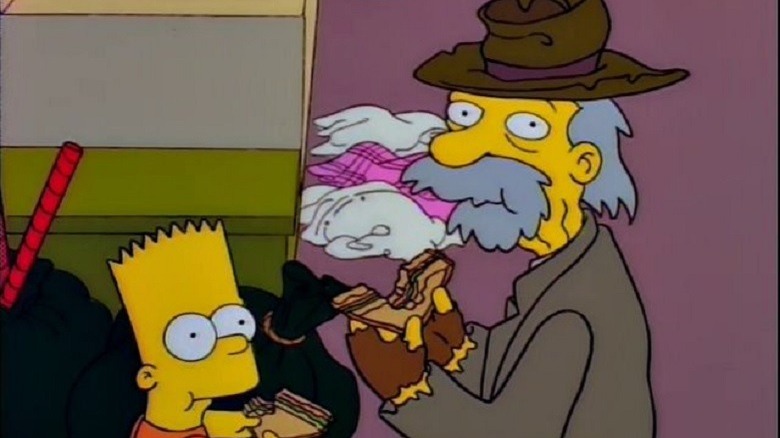
There's a delightful matter-of-factness to the unheralded creator of "Itchy and Scratchy." Whether he's insisting that a major cartoon studio pay him billions of dollars in compensation or is simply preparing to sleep in a radon-filled basement, Chester J. Lampwick takes it all in stride (that is, unless you serve him substandard baked goods in exchange for his handiwork; then he's spoiling for a fight).
Only the legendary Kirk Douglas could make such a wonderfully out-there character work. Regardless of the bumps in the road of his rags to riches story, Lampwick maintains an even keel, and Douglas' stern steadiness breathes life into the latest miscreant to shack up with the Simpson family.
A big part of what makes ol' Chester stand out, however, isn't just his rocket car or his solid gold house (though he's not too far removed from the streets to give up offering passersby a shoeshine). It's that he represents overlooked or undercompensated creators everywhere, a phenomenon that persists to this day. Lampwick's grumpy triumph (and payday) are inspirational, in that fractured "Simpsons" sort of way, and make him a shoo-in for inclusion here.
Vicki Valentine (Tress MacNeille) — Last Tap Dance In Springfield
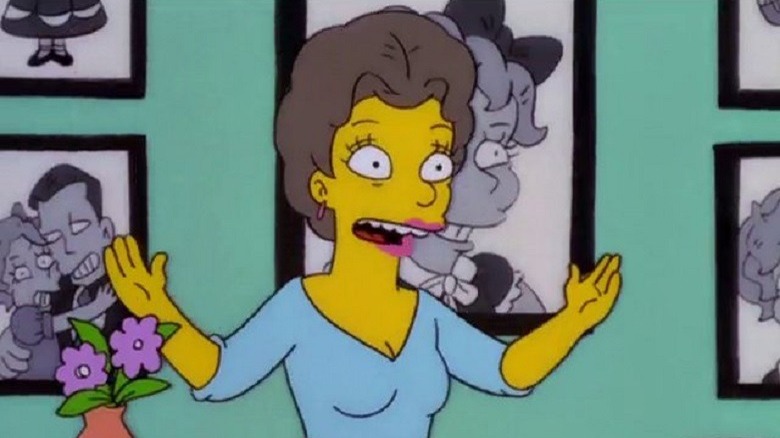
We're ever-so-pleased to induct Little Vicki Valentine onto this list. When Lisa wants to become a dancer, Marge takes her to a studio run by this amusing pastiche of classic child stars like Shirley Temple. Only now, Vicki's all grown up and ready to mix saccharine Tinseltown smiles with stage mom-esque jabs and unhelpful comments.
The character's a treat in both her youthful form, dancing to save her cat in one of her classic childhood romps, and as the washed up, chipper-but-useless dance teacher in the here and now. Sadly, all she has to offer by way of real instruction are those three immortal words: tappa tappa tappa.
When Lisa's less than a natural on the stage, Miss Vicki demotes the young Simpson to curtain-puller and takes the recital's lead role, stealing the spotlight from her eight-year-old pupils. It's a cold move, one made all the more entertaining by Vicki's sunniness amid each put-down. Voice actor extraordinaire Tress MacNeille finds the venom behind the one-time movie moppet's mirth, making the trying tap-teacher one to remember.
Roy (Hank Azaria) — The Itchy & Scratchy & Poochie Show
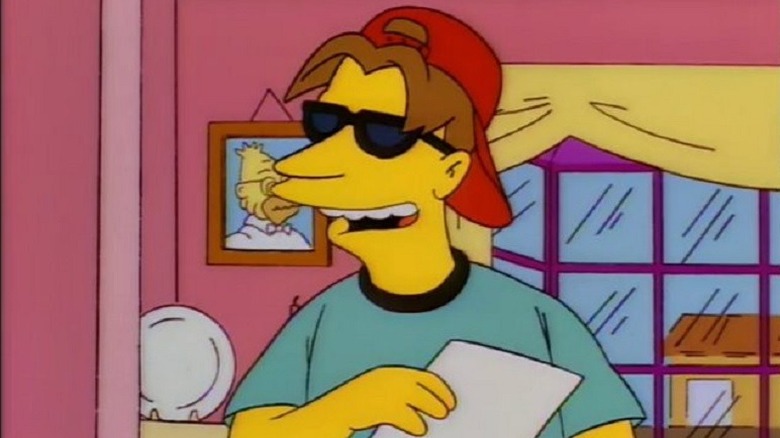
There's not much to Roy. He utters about four lines, injects a bit of faux-hip slang, and then is quickly off on his own unseen adventures with "two sexy ladies." But the barrenness of Roy's empty personality is the point. He's a pitch-perfect parody of how long-running shows inject a dose of the superficially new and cool into the series, often in bizarre, almost surreal ways. In fact, Roy makes his first appearance in "The Itchy & Scratchy & Poochie Show" right after Lisa proclaims, "Adding a new character is often a desperate attempt to boost low ratings."
Cut to the man himself, a never-before-seen addition to 742 Evergreen Terrace who refers to Homer as "Mr. S" (a la the Fonz) and has the same backwards hat and sunglasses as a newly-unveiled cartoon dog. His completely unexplained arrival and ever-clichéd responses to the various goings-on at the Simpson household make him an endearing spoof of cheap television ploys.
Professor Lombardo (Jon Lovitz) — Brush With Greatness
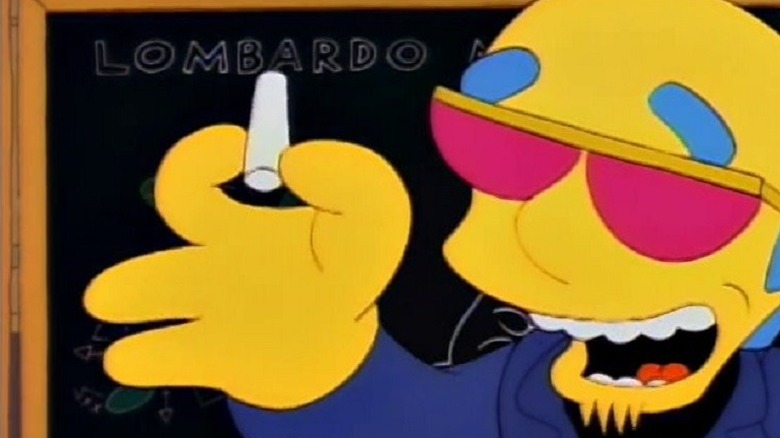
Jon Lovitz deserves to be included in any list honoring great "Simpsons" guest performers. The problem is that he puts such fantastic energy into each one of his animated personalities that the show keeps bringing them back! Thank goodness, then, for Professor Lombardo, Marge's art teacher from "Brush with Greatness," a one-timer who nevertheless shows off Lovitz's prodigious talents.
Professor Lombardo is a doggedly encouraging gentleman. Despite Marge's reluctance about her artistic talents, he recognizes his student's gift for seeing her subjects' inner beauty. But Lombardo's compliments aren't limited to the artistry of one blue-bouffanted homemaker. He declares even the output of a workman painting a sign in the hallway as "another triumph" (ironically, he doesn't take praise very well himself).
Lombardo's pip and good cheer give Marge the boost she needs to follow her dreams. As a reflexively supportive instructor in an otherwise harsh business, bolstered by Lovitz's usual panache, the positive professor makes for a great entry in the long-running and fruitful history of Lovitz-"Simpsons" collaborations.
Shary Bobbins (Maggie Roswell) — Simpsoncalifragilisticexpiala(Annoyed Grunt)cious
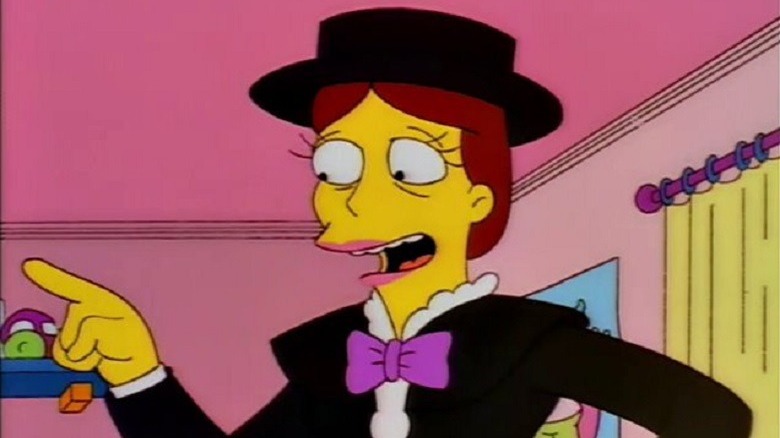
Does an obvious Mary Poppins parody belong here? Yes, when she's as practically perfect as this one. For her part, Shary downplays her resemblance to a certain other magical nanny, declaring that she's an original creation, just like "Rickey Rouse" and "Monald Muck".
It's Shary's differences from P.L. Travers' classic character, however, that make her so hilarious. Shary Bobbins may be a send-up, but there's something just a little cracked lurking beneath her cheery demeanor. While Mary sings about making chores fun, Shary simply encourages her young wards to do a "half-assed job." While Mary heals the dysfunctional family that hires her, Shary's charms fall woefully short for the Simpson brood. And while Mary leaves the Banks household in the throes of a job well done, Shary inevitably bails on our favorite family upon realizing they're "all a bunch of apes."
Shary's cynical spin on a spritely classic -- showing how the crude, slovenly Simpsons are enough to break even the brightest and most magical of spirits -- makes her one-off appearance a definite winner.
The Great Raymondo (Martin Landau) — The Great Simpsina
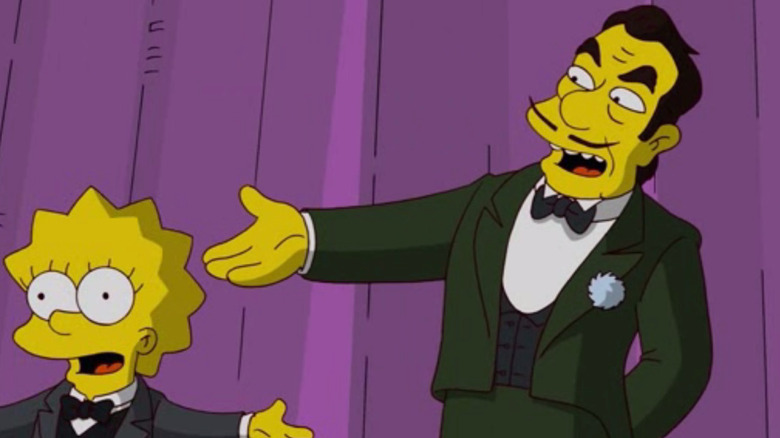
Maybe it's just the appeal of Martin Landau playing another wistful former star fallen on tough times (hello fellow "Ed Wood" fans!), but his turn as washed-up magician the Great Raymondo is a late-season gem for "The Simpsons".
Raymondo becomes an unlikely mentor to Lisa when she develops an interest in magic. He goes so far as to teach her his signature trick. But the two have to find equilibrium again after Lisa accidentally gives the secret away to Raymondo's young rival.
Landau handles the character's sardonic humor and amusing pessimism about the magic business perfectly, but he also masters the soft undercurrent of emotion at the character's heart. There's a gentle melancholy to the old trick-master, who still harbors regrets about his deceased wife-slash-assistant, his failed career, and the places where the two intersect. A line like "the only magic we couldn't make is a child," may be heavy for a comedy show, but it informs his bond with Lisa, and it makes both "The Great Simpsina" and Raymondo himself one of the underrated successes of the show's later run.
Space Coyote (Johnny Cash) — El Viaje Misterioso De Nuestro Jomer
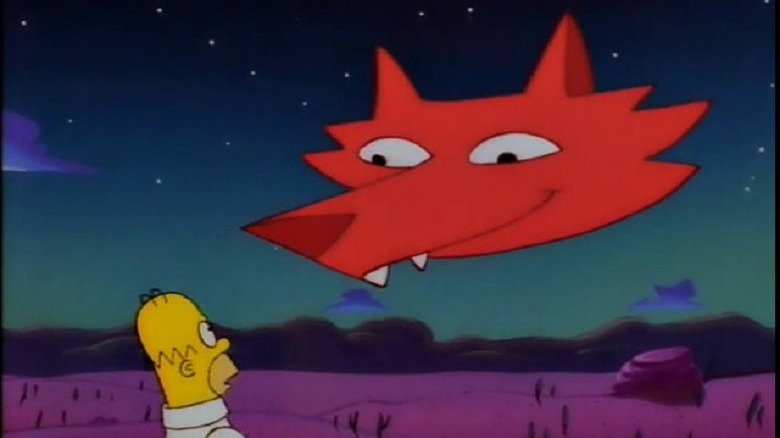
Hey, if you could get life advice from a whimsical desert critter with the gritty baritone of Johnny Cash, you too might gulp down some Guatemalan insanity peppers. So many things stand out about the famed Space Coyote from Homer's capsaicin-induced hallucination. The easiest of them, though, is Cash's trademark rumbling timbre. The Man in Black wasn't a voice actor by trade, of course, but he adds instant, weather-worn gravitas to the spirit guide's wisdom.
Still, the unique design of Homer's mystical friend warrants mention as well. There's a Cheshire Cat quality to the coyote's entrance, and an angular, ethereal look to him that makes the desert coyote as visually striking as he is vocally arresting.
His presence finds the right balance between profundity (encouraging Homer to find his soulmate) and humor (gnawing at Homer's leg because, well, he's still a coyote). Put it all together and you have one of the most unique and enjoyable guest appearances on "The Simpsons," even if he can't give you any new information.
Bea Simmons (Audrey Meadows) — Old Money
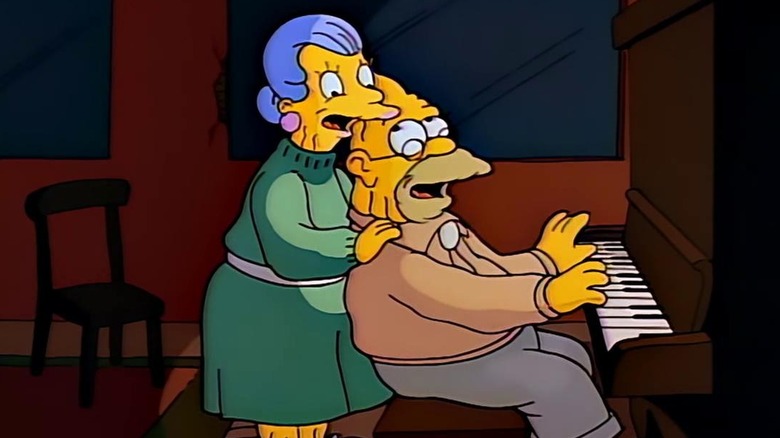
Two senior citizens having their pills mixed up at the retirement home isn't your traditional meet-cute, but Grampa's short-lived yet irrepressibly sweet romance with Bea Simmons was an early "Simpsons" highlight. The kind and caring Bea renewed the old coot's lust for life, and the montage of the pair's courtship set to "Embraceable You" is wholesome as heck.
What makes Bea so memorable, though, is how she inspired Abe even after her death. Coming back as a ghost (a rarity outside of "Treehouse of Horror") certainly makes that a little easier. Still, supernatural advantages aside, Bea also bequeaths Abe a good chunk of change and inspires him to use it to spice up the lives of his fellow seniors, the way she did his.
Like so many great guest characters, Bea walks the line between comedy (explaining that she's haunting a family in Texas) and heart (encouraging Abe to reconcile with Homer). But her sincere connection with Grampa and her meaningful presence in his life, even after her death, gives her a legacy for both Grampa and "The Simpsons".
Poochie (Dan Castellaneta) — The Itchy & Scratchy & Poochie Show
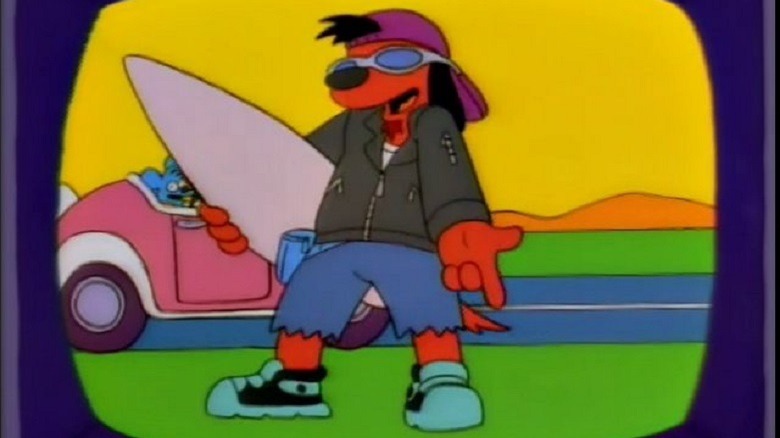
Look, this is cheating a bit. Roy already represents this episode with aplomb on this list and, technically, Poochie does have a single line in a subsequent cameo. But this "rockin' dog" is such a perfect symbol of embarrassing, group-think'd efforts to be cool in kids' entertainment that his inclusion here simply cannot be denied.
Whether it's Poochie's hilariously bad rap, the urge to "rasta-fy him by ten percent or so," or his uproariously funny postscript post-mortem on the way to his home planet, Poochie represents everything absurd and misguided about corporate boardroom attempts to generate something hip.
The proactive pooch, voiced by Homer's voice actor, Dan Castellaneta, was the writers' response to real-life executives who encouraged them to introduce a new character to "The Simpsons." Not only is Poochie's mere existence as a Frankenstein's monster of youth clichés hysterical, but his status as a living, skateboarding, rapping jab at studio interference makes him an instant classic.
Stacy Lovell (Kathleen Turner) — Lisa Vs. Malibu Stacy
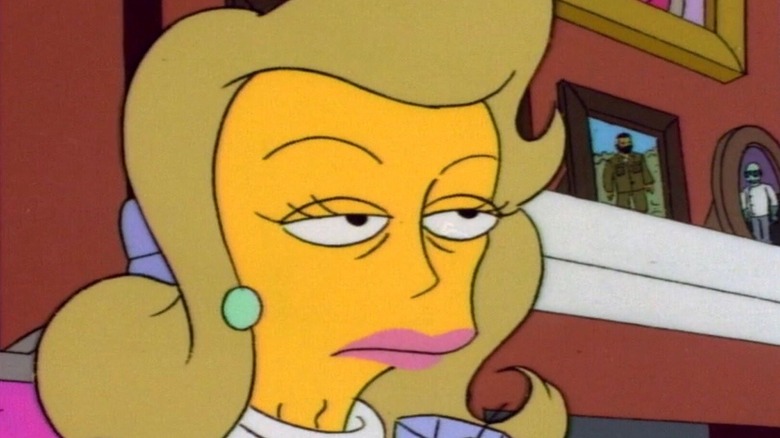
When Lisa goes on a crusade against the sexism of dolls sold to little girls, she decides to take her complaint all the way to the creator of Malibu Stacy herself. What she finds in Stacy Lovell is whiskey-soaked cynicism that serves as a perfect foil to Lisa's agitating enthusiasm. They duo are the perfect pair to try to bring the ersatz Barbie doll into the modern age.
Kathleen Turner is brilliant in the aptly titled "Lisa vs. Malibu Stacy." Her dry, sarcastic tone is a godsend, made all the more potent by Turner's gravely tenor. And the episode smartly balances her status as a bitter, pushed-out creator while also making her the literal embodiment of Malibu Stacy and her dream world.
Whether she's reflecting on her five marriages, angrily informing the Simpsons that they all have "hideous hair," or mumbling about funneling profits to the Viet Cong, every line out of Stacy's mouth is a hoot, which is more than be said for the doll that bears her name.
Rex Banner (Dave Thomas) — Homer Vs. The Eighteenth Amendment
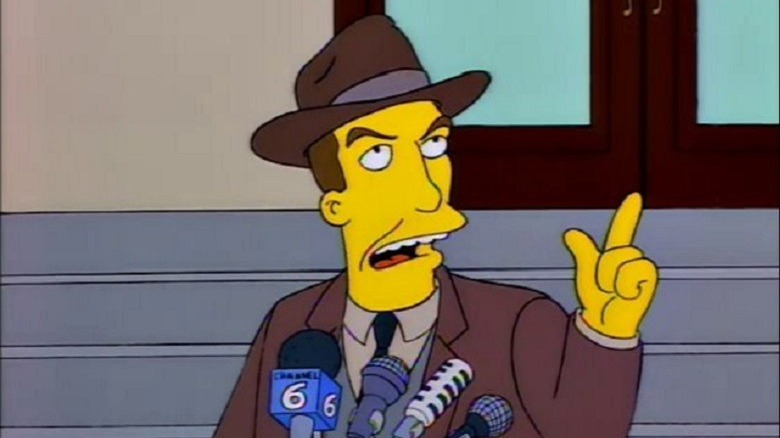
Contrary to his no-nonsense demeanor, Rex Banner gave viewers of "Homer vs. the Eighteenth Amendment" plenty of reason to -- ckk-ghh-shkk-hrrng -- well, you all know what laughter sounds like. A superbly crafted performance from "SCTV" talent Dave Thomas made Springfield's new police chief the perfect antithesis to Homer "Beer Baron" Simpson.
A big part of what makes the character so enjoyable is that, despite seeming to be one of the few competent professionals in Springfield, he's no more successful at stopping the town's bootlegging than the usual crop of bumblers. That Banner's outwitted by the likes of Moe (owner of the dubiously-proclaimed "best pet shop in town") and the doltish Homer only adds to the humor.
The hard-boiled, prohibition-era copper, out to get Homer's amusingly inept Beer Baron, makes for a hilariously strait-laced new element to mix in with the typical looney lot of "The Simpsons." It's enough to catapult him to the number four spot on our list.
Lyle Lanley (Phil Hartman) — Marge Vs. The Monorail
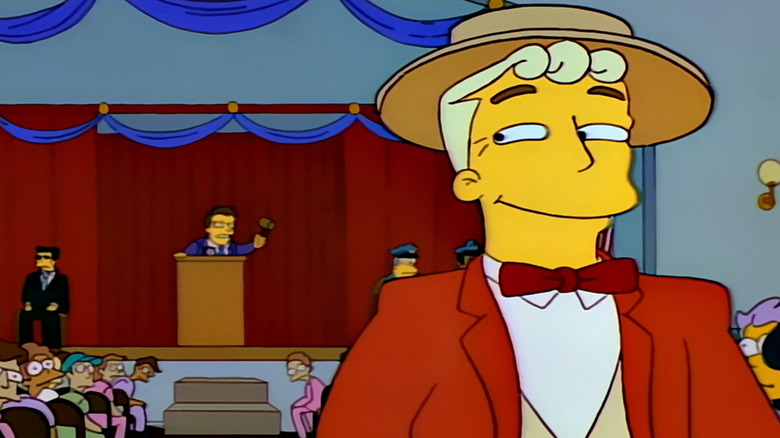
What did audiences in 1993 demand from their animated sitcoms? Why, extended riffs on public transportation and spoofs of "The Music Man," of course. Enter Lanley -- Lyle Lanley, that is -- a parody of Harold Hill who pops into Springfield to sell the gullible townsfolk a genuine, bona fide, electrified, six-car monorail.
National treasure Phil Hartman assumes the role with his usual gusto, breathing life into a superb script by a pre-fame Conan O'Brien. Hartman had an uncanny ability to take outsized characters, make them oddly plausible, and turn almost every line into a laugher. His conman-turned-showman sweeps the Simpsons, their town, and the audience off their feet, and rightfully so. Lanley's performance of the all-time classic monorail song, his patient humoring of the sheep-like denizens of Springfield, and his subtle panic and menace as the truth of his grift slowly comes to light make the behatted barker a beloved figure far beyond Brockway, Ogdenville, and North Haverbrook.
Hank Scorpio (Albert Brooks) — You Only Move Twice
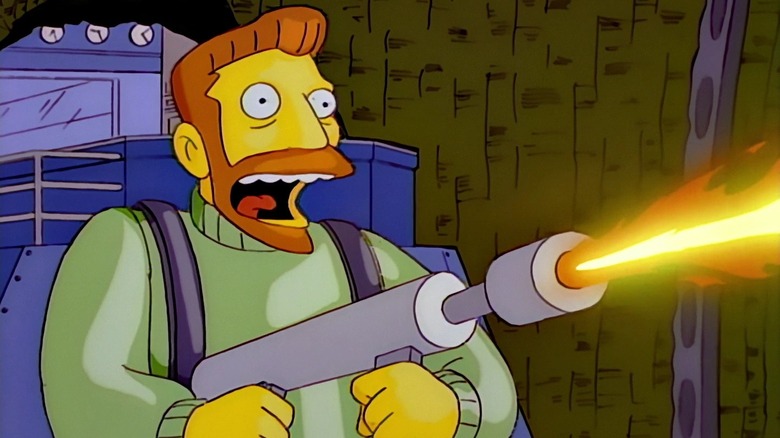
The formula for Hank Scorpio is deceptively simple: combine one part Bond villain, and two parts friendly Silicon Valley boss. The basic twist of the character's landmark appearance in "You Only Move Twice" is that this genial, genuinely nurturing company CEO is, in fact, a Blofeld-esque criminal mastermind poised to seize the East Coast. The comic distance between the friendly manager and the globe-threatening megalomaniac makes Mr. Scorpio a superbly-conceived character from the jump.
But what puts him over the top is the way Albert Brooks, one of the all-time most reliable guest stars on "The Simpsons," takes the character and makes him his own. It's not just Brooks' improvisations -- including his famous riff on the hammock district -- but the chipper, indefatigable attitude that Brooks injects into every line.
The great rapport between Hank and Homer adds to the comedy and makes it extra melancholy when Homer has to bid farewell to the criminal enterprise he's oblivious to. Only a performer like Brooks could sew the two disparate parts of Hank Scorpio into a single, back-patting, France-destroying dynamo of a boss.
Mr. Bergstrom (Dustin Hoffman) — Lisa's Substitute
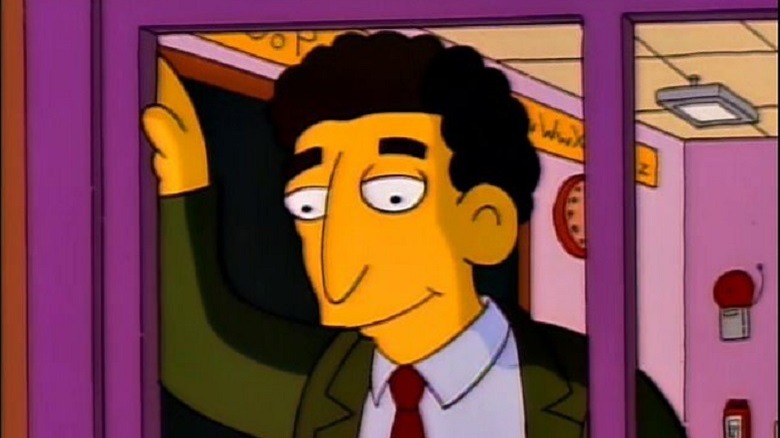
It took an Oscar winner's silly-but-sincere take on Lisa's unorthodox substitute teacher to give "The Simpsons" one of its first and most moving emotional moments. Most of us remember that mentor who reached us, who inspired us to look at the world differently, and who taught us to see the potential inside of ourselves. For Lisa, that was Mr. Bergstrom.
Mr. Bergstrom is believable both in his freewheeling tutelage and in his moments of genuine connection with a very special student and misfit. It's no secret that Lisa doesn't exactly have the greatest male role model at home. But, for one glorious stretch of days in "Lisa's Substitute," she had an off-kilter but endearing example in someone who's intellectual but fun, and smart but irreverent.
Until he had to say goodbye. There are few more powerful moments in "The Simpsons" than Mr. Bergstrom's inevitable departure, accompanied by his reassurances that all that his precocious pupil needs to remember is "You are Lisa Simpson." His presence livened, challenged, and ultimately enriched the life of little Lisa, and it earns him the top spot on our humble list.
Read this next: 'The Simpsons' Showrunner Al Jean On Upcoming Guest Stars And The Show's 'Into The Spider-Verse' Parody [Interview]
The post The 15 Best Simpsons One-Off Characters Ranked appeared first on /Film.
0 Commentaires